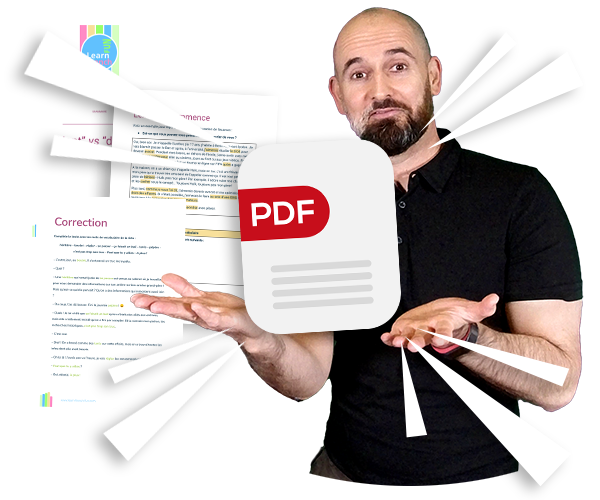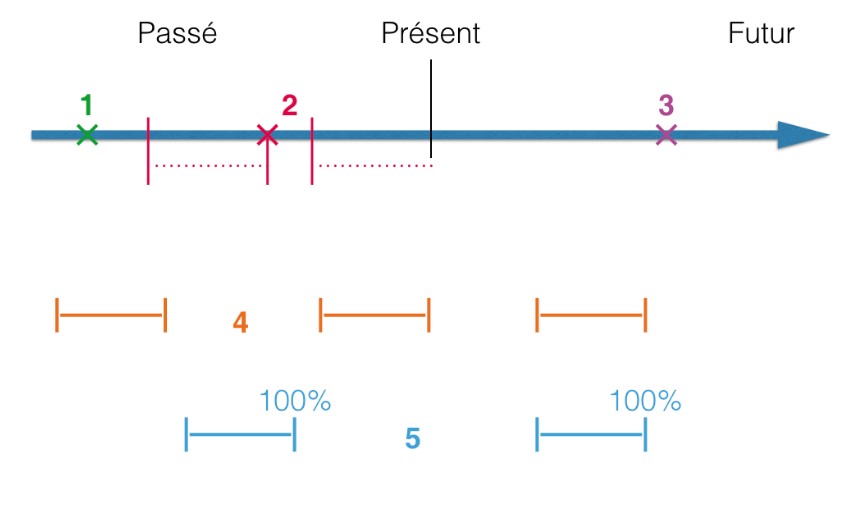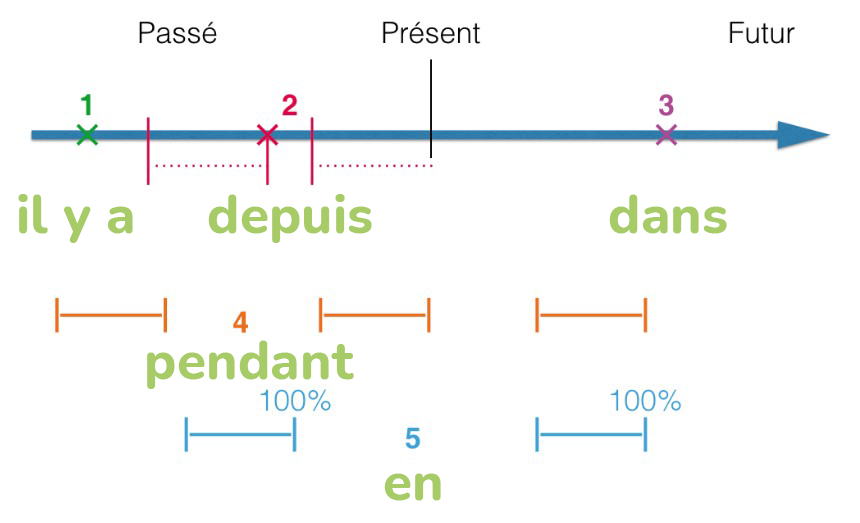Hi, today I’m going to teach you a super simple way to say how long something will last in French. Forget all those complicated grammar rules that will only confuse you! Here the secrets of DEPUIS, DANS, IL Y A, PENDANT and DEPUIS…
How to learn French without grammar? No, not in this lesson 😆
- Summary table of the use of Depuis, Pendant, En, Il y a and Dans
- French preposition of time: il y a
- French preposition of time: depuis
- French preposition of time: dans
- French preposition of time: pendant
- French preposition of time: en
- Correction of the pattern of depuis, pendant, en, il y a, dans to express duration in French
- ✔️ French QUIZ
- Articles that might interest you:
This lesson is for everyone, French beginner learners, intermediate learners and even advanced learners, so let me show you what it’s like on the other side. But I know from experience that it’s more of a problem for intermediate students. So, whether you want to prepare for the DELF A2 or the TCF, read carefully and do the exercises you’ll find at the end of this article.

PDF Bonus
We have prepared a free PDF to help you understand and master the prepositions of time in French.
👉 Download it for free
At the end, you will have exercises to practice with the correction. 👍
Summary table of the use of Depuis, Pendant, En, Il y a and Dans
| DEPUIS | PENDANT | EN | IL Y A | DANS |
| Continuity | Limited duration | Time required to perform an action | Moment in the past | Moment in the future |
| As we speak, the action continues. | At the moment of speaking the action is finished. We are talking about a limited period in the future We are talking about a general situation. | We are talking about the time needed to accomplish the action. | We’re talking about something that happened. | We’re talking about something that’s going to happen. |
| Verb in the present or past tense. | Verb in the past, present or future tense. | Verb in the past, present or future tense. | Verb in the past tense. | Verb in the present or future tense. |
But let’s look at these prepositions of time to express duration in French in more detail.
We’ll start with a little diagram – a drawing – it’s always easier that way!

Where are you going to put the following words that express duration: il y a, dans, pendant, depuis and en?
Let’s start!
For the number 1, what do you suggest? For the 2? Etc.
Don’t look at the answer key right away, but try to find the answer based on what you already know and the summary table above.
I will explain each preposition in detail and then I will post the correction.
Do you like learning French with videos?
Receive our free video newsletter every Friday in your e-mail box. You will get 3 “Tips & Tricks” on grammar, vocabulary, phonetics or French culture.
👉👉 Sign up now!
French preposition of time: il y a
It expresses the same idea as “ago” in English.
Attention, we do not use a date with, but a duration between the date of the event and today.
Examples:
- Il y a deux ans, je suis allé en vacances en Italie.
(Two years ago, I went on vacation to Italy.) - Il y a cinq minutes, j’ai vu ton frère passer.
Five minutes ago, I saw your brother walk by
French preposition of time: depuis
Depuis expresses a duration that began in the past and continues as we speak.
Most of the time, depuis is used with a verb in the present tense, but it is also possible to have a verb in the past tense.
Examples:
- Depuis six mois, je travaille nuit et jour.
For the past six months, I have been working night and day. - Je l’attendais depuis une heure, quand il est enfin arrivé.
I was waiting for him for an hour, when he finally arrived. - Depuis que je la connais, je suis de meilleure humeur.
Since I met her, I am in a better mood.
We can also use SINCE with a date. We will always express a duration but taking the given date as the starting point.
Example:
- Il travaille dans cette entreprise depuis 1998.
He has been working in this company since 1998.
French preposition of time: dans
Dans expresses the duration that separates an action between the present moment and a moment in the future.
The verb used will then be in the future tense (simple future or near future) or also in the present tense. You probably know that the present tense can be used with a future value.
Examples:
- Dans deux heures j’aurai rendez-vous avec mon professeur.
In two hours I will have an appointment with my teacher. - Dans six mois je partirai faire le tour du monde.
In six months I’ll go on a world tour.
French preposition of time: pendant
Pendant is the magic word to express a duration. You can use it in many situations, with verbs in all tenses.
⚠️ Be careful, because very often students use the word pour instead of pendant!
Pour expresses the goal.
Examples:
- Tous les jours, je travaillais pendant quatre heures sur mon projet.
Every day, I worked for four hours on my project. - L’an prochain, elle ira en Italie pendant six mois.
Next year, she will go to Italy for six months. - Je peux regarder la mer pendant des heures.
I can look at the sea for hours.
French preposition of time: en
En is the most difficult preposition of duration to understand because of its particular use.
First, you know that the word en has multiple uses. It can be:
- A pronoun
- A preposition of time
- A preposition of place
- etc.
Here, we are interested in the word en to indicate duration in French.
En gives us additional information to the simple indication of duration, it clearly expresses that 100% of the action of the verb has been performed.
For example, what is the difference between these two sentences:
- Anna a appris le français pendant six mois.
- Anna a appris le français en six mois.
In the first sentence, we just know that Anna has learned French for six months. But what is her level of French? We don’t know. Maybe she is A2, B1 or B2?
Whereas in the second sentence, we always know that the duration of learning French lasted six months but we also know that she finished learning! She knows all the French.
Anna is very strong! 😄
Correction of the pattern of depuis, pendant, en, il y a, dans to express duration in French
So? Did you get it right? 😀

If you want, you can download the Little Bonus PDF, in which you will find:
- the synthesis of this lesson,
- exercises to practice with the words of the duration,
- as well as the correction of the small dictation that you can hear in the video (you can see the video at the beginning of this page).
Yes, I know, a dictation… Pffff! But this way, you will be able to see, in situation, the words I just explained to you. It’s a great way for you to understand them, memorize them and then be able to use them without making mistakes.
✔️ French QUIZ
Depuis, pendant, en, il y a, dans
Before leaving, let’s take this little quiz together to see if you understand 😀
Results
#1. Je l'attends _______ deux heures
#2. Il ne travaille plus _______ l'âge de soixante ans.
#3. J'ai vécu _______ de longues années en Allemagne.
#4. Il travaille _______ la semaine et se repose le week-end.
#5. Normalement, je finis de travailler _______ deux heures.
📌 Free PDF Bonus:
Do you want to do more exercises on prepositions of time in French and have the correction? Have a summary sheet of the lesson?
Then download the free Bonus PDF!
And as always, the best way to improve your French is to speak as much as possible! Have confidence in your French and speak!
And I recommend you also read our article on the difference between and use of the prepositions à and de.
Ciao, see you soon 😃
Articles that might interest you:
- The Imperative in French: How to Conjugate Verbs in Imperative? When do You Have to Use the Imperative?
- The 10 Irregular Verbs in the French Subjunctive Mood
- Depuis, pendant, en, il y a, dans
- All the secrets of the French gerund!
- French verb moods
- How to use the tonic pronouns in French?
- How to use “en” and “y” pronoun in French?
- Difference between DONT and DUQUEL in French
- 10 common French verbs conjugated in the present tense. Beware of traps!
- The Direct Object Complement in French (C.O.D.) and direct complement pronouns (le, la, les…)






